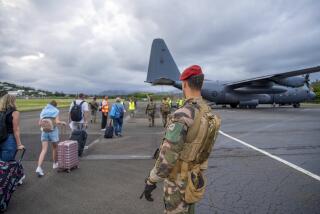Chirac Ordered New Caledonia Raid in a Bid to Win Election, Defense Chief Says
- Share via
PARIS — Former Premier Jacques Chirac, the defeated conservative candidate in the recent presidential election, ordered a bloody and controversial raid earlier this month on a Melanesian separatist hide-out in New Caledonia mainly in an effort to win votes, Defense Minister Jean-Pierre Chevenement charged Tuesday.
“I think that the electoral context weighed heavily on this affair, for the pressure from the premier was intense,” Chevenement, a Socialist, said in a television interview.
In another interview, on radio, he said, “It is obvious that there was constant and excessive political pressure.”
This was quickly denied by Bernard Pons, the former minister of overseas territories who directed the government strategy on the scene in New Caledonia. Pons insisted that Chirac had instructed him to do everything possible to release the hostages through negotiation.
“We tried everything,” Pons said in a television interview. “We contacted the parents of the kidnapers, their tribal leaders, but nothing worked.”
Bitter Backbiting
The remarks of Chevenement and Pons, coupled with bitter backbiting by others involved in the affair, appeared to insure that the troubles in New Caledonia will continue to figure in the current campaign for parliamentary elections.
This was not good news for the conservatives, who control the National Assembly but are expected to be defeated decisively in two rounds of voting June 5 and 12. The conservative mood is so morose that their leaders are considering mostly how to diminish the size of the expected Socialist majority. Controversy over New Caledonia will not help.
Tension increased in New Caledonia on Tuesday when a French soldier on patrol shot and killed a Melanesian in the early morning hours. An army report said the soldier fired after being threatened, but Chevenement ordered an investigation.
The killing prompted separatist leaders to postpone their scheduled meeting with a special commission sent to the territory by Premier Michel Rocard in an effort to ease the rift.
At the root of the problem in New Caledonia is a deep sociological division. Leaders of the Melanesians, who make up 43% of New Caledonia’s population, advocate independence for the territory but have been outvoted by whites and Asian immigrants who want it to remain French.
23 Hostages Freed
In the May 5 raid, French soldiers and gendarmes freed 23 hostages held by Melanesian separatists in a sacred cave. But freedom came at the cost of 21 deaths--two gendarmes and 19 Melanesians. The separatists, in taking the hostages two weeks earlier, had killed four gendarmes.
Various investigations have been undertaken, including one by inspectors of the Defense Ministry, and Premier Rocard has promised that his government will shed full light on the affair. But the French press is not waiting for the official accounts before publishing disclosures of its own.
The most sensational was revealed last weekend in the influential Paris newspaper Le Monde, which published excerpts from a secret, official report made by Capt. Philippe Legorjus, the head of a special gendarme commando unit that played a prominent part in the incidents.
The excerpts appeared to lend weight to the theory that political considerations outweighed all others in the affair. The raid took place just three days before the final round of the presidential election, at a time when Chirac was trying desperately to catch up with President Francois Mitterrand, the Socialist candidate. In the end, Mitterrand won reelection easily, defeating Chirac by 53% to 47%.
Legorjus, a dynamic young officer who studied law before joining the national paramilitary police force known as the gendarmerie , had sought out the abductors in the cave, fallen into the trap of becoming a hostage himself and then served as a mediator between the Melanesian separatists and the government.
‘Operation in Force’
In the report, Legorjus said that Pons, then minister of overseas territories, had refused the officer’s suggestion of allowing a prominent separatist to serve as a negotiator. At a meeting with Pons, Legorjus said, Gen. Jacques Vidal, the commander of French forces in New Caledonia, had made it clear “that he wanted an operation of force, no matter what the consequences.”
The captain wrote that those at the meeting had talked about using a 500-pound, laser-guided bomb, a series of napalm bombs or a helicopter equipped with 20-millimeter cannon to attack the cave. But, the captain said, protests by officers like himself had convinced them that such force was too dangerous. The attacking soldiers and gendarmes used smaller and more conventional weapons.
The raid had been approved by Mitterrand, but he has insisted that he gave his approval only after being assured that it could be carried out with little bloodshed.
In a news conference Tuesday, Pons defended his role in the affair, insisting that he had not wanted to use force in the operation but that “it was indispensable.” Pons said the raid was ordered because “the kidnapers were murderers” and “had refused all negotiation.”
More to Read
Sign up for Essential California
The most important California stories and recommendations in your inbox every morning.
You may occasionally receive promotional content from the Los Angeles Times.













